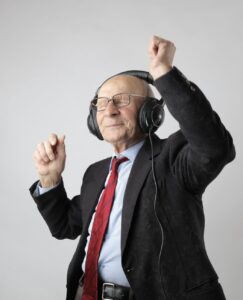Can your hearing be normal when you grow old ?
In 1909, the term ‘Geriatrics’ was coined. At that time only 4% of the US population was over 65 years and the average life expectancy was only 45 years. In 2015, this rose to 15% of the population. In 2019 the average life expectancy of the US population was 79 years, that in Canada was 82 years, UK was 81 years and India was 70 years. Of those over 65 about 10 -15% are frail.
There are many problems of the Ear seen in the elderly and the most common is the Age Related Hearing Loss (ARHL)
Age Related Hearing Loss
Hearing loss occurring in the elderly is called Presbycusis in medical parlance. It is a progressive irreversible, symmetrical loss of hearing in both ears. The hearing defect mainly is for high frequency sounds. It is seen in 1 in 3 persons over the age of 65. More common in men than in women. This is a very disabling feature as it may result in falls, depression and isolation. The disability is worsened when the ambient noise is more as in a busy marketplace, malls, railway stations, restaurants etc.
What are the problems of the elderly with ARHL?
During early stages, hearing impairment may be unrecognized. It is often the spouse who notices it early. The individual may complain that speech of others is “not clear” and feels like ‘mumbling’ or ‘slurring’ to him. Often sounds like ‘s’ and ‘th’ may not be recognized.
They may not understand conversation especially in the presence of background noise. They may ask people to repeat what they said.
One of their main problems is the inability to hear high pitched sounds like bells, whistles, child’s or a woman’s voice, music like flute, clarinet etc. But the low pitch voices of men may be heard fairly well.
Some times they feel that certain sounds are disturbingly loud for them as in TV or music kept at high volume.
These individuals often tend to speak in a voice louder than normal
Occasionally they may feel a ringing or buzzing in the ear. -this is called Tinnitus.


What other causes can produce Hearing Loss?
· Continuous exposure to loud noise may cause hearing loss as in factories, quarries etc.
· Some types of hearing loss are inherited.
· Diseases like High Blood Pressure, Diabetes and Stroke can lead to hearing loss
· Some medications like Aspirin, some antibiotics, certain heavy metals and medicines used for heart diseases and chemotherapy of cancer also may cause hearing loss.
What harm does the hearing loss in the elderly do?
Due to the inability to converse normally with their close relatives and friends, their quality of life deteriorates. They may be socially withdrawn due to embarrassment or frustration at being unable to join a normal conversation.
Hearing loss can lead to dementia and memory loss, and the risk is said to be 2 to 4 times that in those without hearing loss. To some extent treatment of hearing loss can reduce the chances of dementia.
The hearing impairment can lead to depression as they feel socially isolated. It affects interpersonal relationships and in those who are employed, it affects their productivity.
Accidents also may be common in them as this can cause mechanical falls and injury to muscles and bones. The risk of falls is twice those in whom hearing is impaired.
The problems can be easily diagnosed by Audiometry and by Word and Speech recognition tests.
As a part of treatment, various Hearing Aids and Implantable devices are now available to treat the elderly with such hearing loss. Others causes for hearing loss like impacted wax in the ear canal, infections of the ear etc., have to be ruled out by a competent ENT surgeon before deciding on treatment.
Hearing aids are of various types and technology has led to tremendous advancements. Wireless technology has also led to a revolution in hearing aids. These can now be connected to other deices like smart phones, TV, Music systems and to the Internet of Things so a to interact with appliances, door bells, smoke detectors etc, thus rendering the life of the elderly easier.
Also there are implants which can be partial or complete. These are also beneficial to some elderly individuals with problems in the middle ear.


How can an Elderly person endure the hearing loss?
First of all, they should always let others know that they have a hearing impairment. This avoids embarrassment on both sides.
They should face people while talking and encourage others to do likewise.
If they do not understand, they should ask the speaker to repeat what they said.
Always a quiet place should be chosen to talk. Background noise must be avoided.
They must consult an ENT surgeon and get appropriate advice and treatment from a competent consultant.
What should we do while talking to the Elderly with Hearing loss?
§ Before we talk to them, we must gain their attention by a gentle touch or addressing them by name or relationship as Daddy, Mummy, Uncle etc.
§ Be sympathetic and understanding when conversing with them.
§ The surroundings should be well lit, and the speaker should face the elderly individual and make eye contact. Find a quiet place to talk to them. Use gestures, if needed.
§ Reduce background noise like other people talking in the background, TV or Radio switched on, Music blaring or in social gatherings where there is constant loud noise.
§ Speak to them slowly, clearly, and sufficiently loudly, but do not shout. Do not speak too fast or mumble.
§ Only one person at a time should speak with the elderly with hearing impairment. Repeat or rephrase your statement or question if they do not understand you.
§ Don’t talk to them from another room.
§ Don’t cover your face or mouth with your hand, or with a handkerchief or any cloth while speaking to them. Don’t speak to them wearing a mask covering your mouth and nose.
§ Don’t interrupt the elderly person when he/she is speaking.
§ Provide information to them in the form of Text, Writing, Directions, Pictures, or Diagrams.
§ Don’t ignore them. If they are in the family, keep them in the loop during conversations.
In short, every effort should be taken to keep them part of the family and include them in all the family groups and conversations. A sympathetic understanding of their problems is very important in ensuring a good quality of life for them.
URL: https://www.amazon.com/author/sahasranamkalpathy
Follow in Medium.com : https://medium.com/me/stories/public
Linked In: Sahasranam Dr. K. V.













